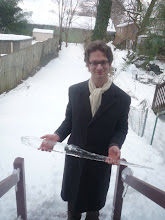A scene from Philosophy Club a couple of weeks ago:
Girl (name withheld since we're not on especially good terms and I don't want to be a total jerk to her over the Internet): *says something about Kannazuki no Miko*
Me: Oh, hey, I just finished rewatching that show! It's not really very good, but I have a bit of affection for it for reasons unrelated to its objective quality.
Girl: Such as?
Me: I'm not always entirely sure why, but in some ways I like the characters a lot, even Chikane given the extreme situations in which she has to make decisions. Of course, they're not perfect by any means.
Girl: Well...I mean, what Chikane did was certainly, on some levels, wrong.
Me: Oh, definitely. That's part of why she did it.
Girl: Yeah. I mean, just think of it in Kantian terms: What if everybody raped their girlfriend in an attempt to incite her to violence so that she'd destroy and recreate the world?
Me: I...I think that the categorical imperative, here, has to be parsed to the level on which not everybody is in a position where that would have the intended effect even if it was done 'correctly'. If it's possible to commit sex crimes correctly, which it isn't, by definition.
Girl: Are you a Kantian?
Me: Kantianism plus some virtue/duty ethics, yes.
Girl: Well, okay, how about...
Me: How about if everybody was the Lunar Priestess and acted as Chikane did? I feel like that's the correct categorical imperative analysis to use here.
Girl: Then it wouldn't be Kannazuki no Miko, dipshit.
Me: It wouldn't be the categorical imperative either.
Best philosophy club or greatest philosophy club?Me: Oh, hey, I just finished rewatching that show! It's not really very good, but I have a bit of affection for it for reasons unrelated to its objective quality.
Girl: Such as?
Me: I'm not always entirely sure why, but in some ways I like the characters a lot, even Chikane given the extreme situations in which she has to make decisions. Of course, they're not perfect by any means.
Girl: Well...I mean, what Chikane did was certainly, on some levels, wrong.
Me: Oh, definitely. That's part of why she did it.
Girl: Yeah. I mean, just think of it in Kantian terms: What if everybody raped their girlfriend in an attempt to incite her to violence so that she'd destroy and recreate the world?

Me: I...I think that the categorical imperative, here, has to be parsed to the level on which not everybody is in a position where that would have the intended effect even if it was done 'correctly'. If it's possible to commit sex crimes correctly, which it isn't, by definition.
Girl: Are you a Kantian?
Me: Kantianism plus some virtue/duty ethics, yes.
Girl: Well, okay, how about...
Me: How about if everybody was the Lunar Priestess and acted as Chikane did? I feel like that's the correct categorical imperative analysis to use here.
Girl: Then it wouldn't be Kannazuki no Miko, dipshit.
Me: It wouldn't be the categorical imperative either.





